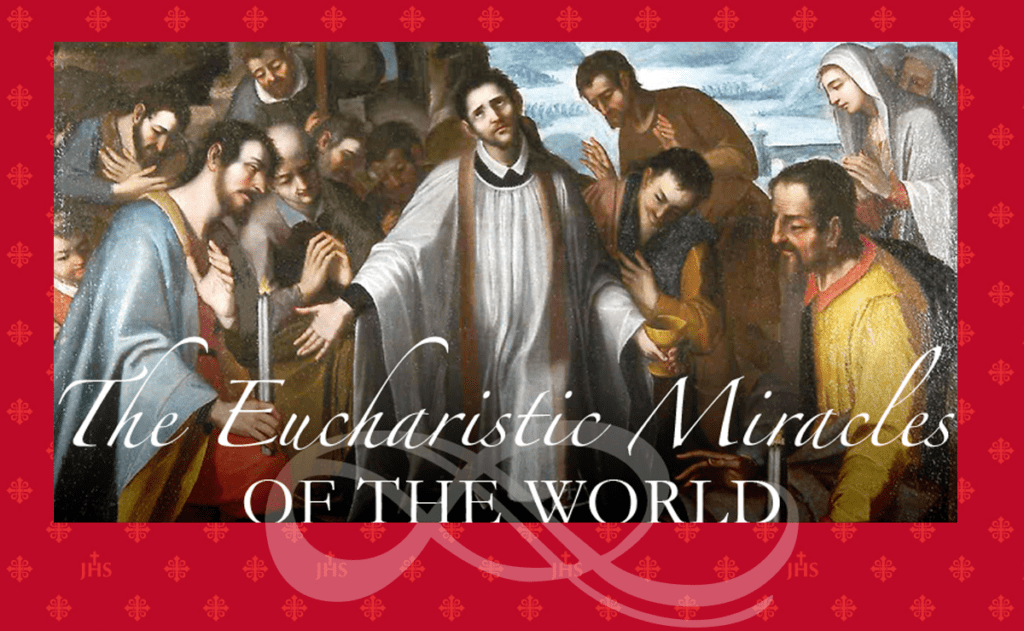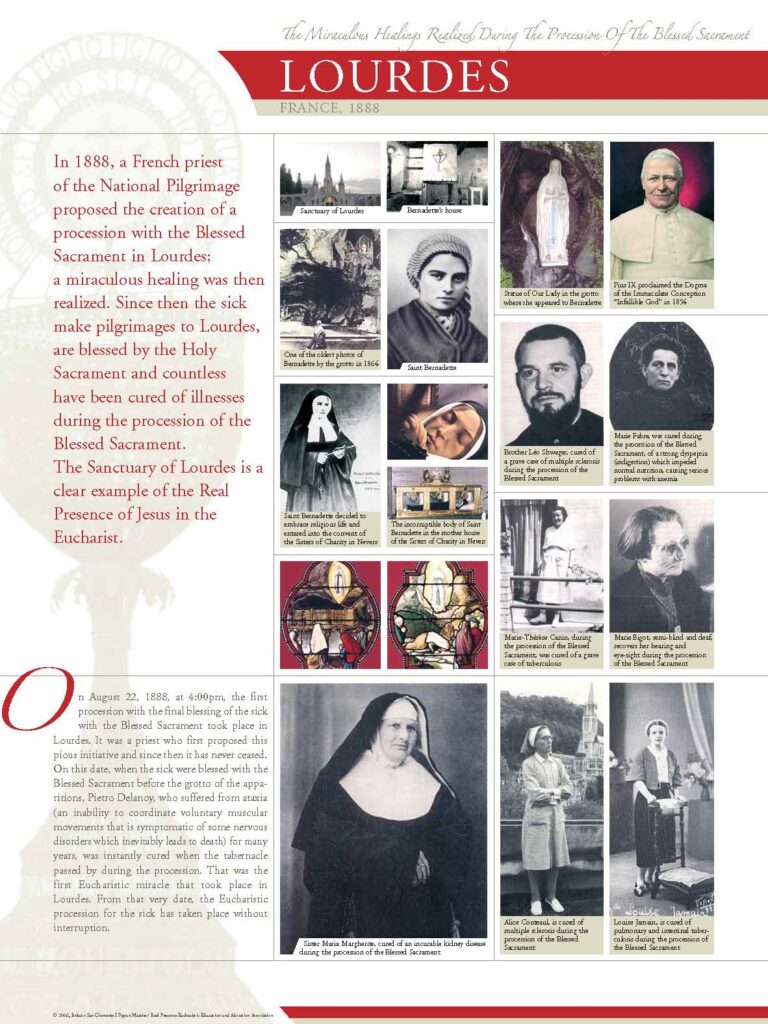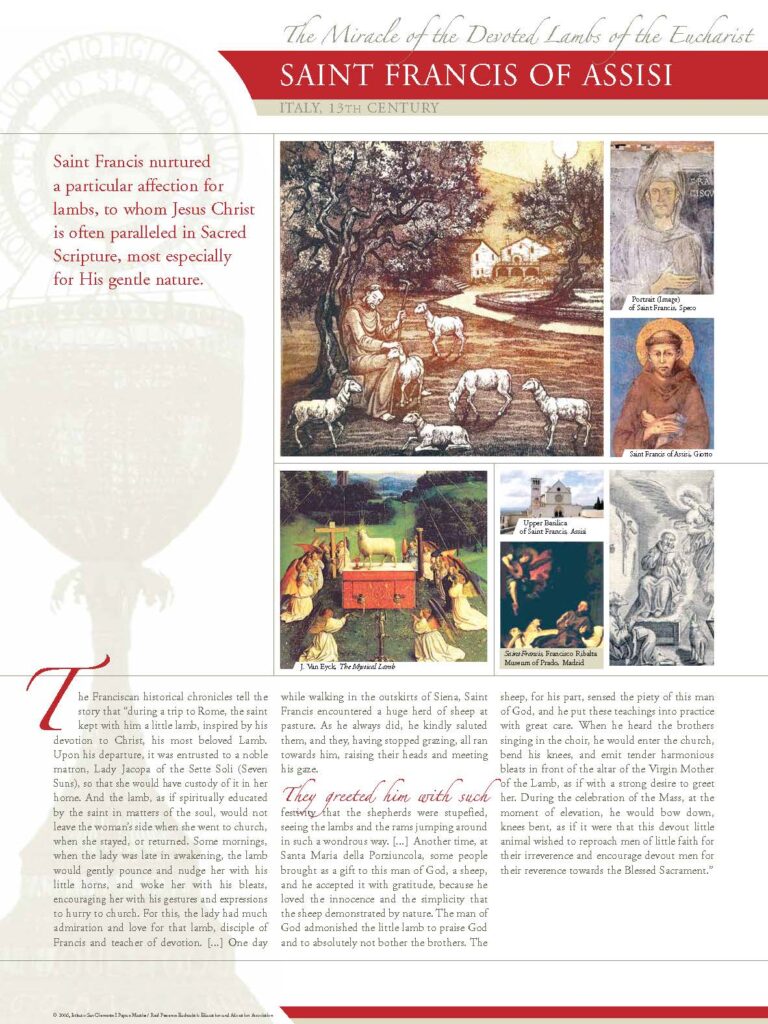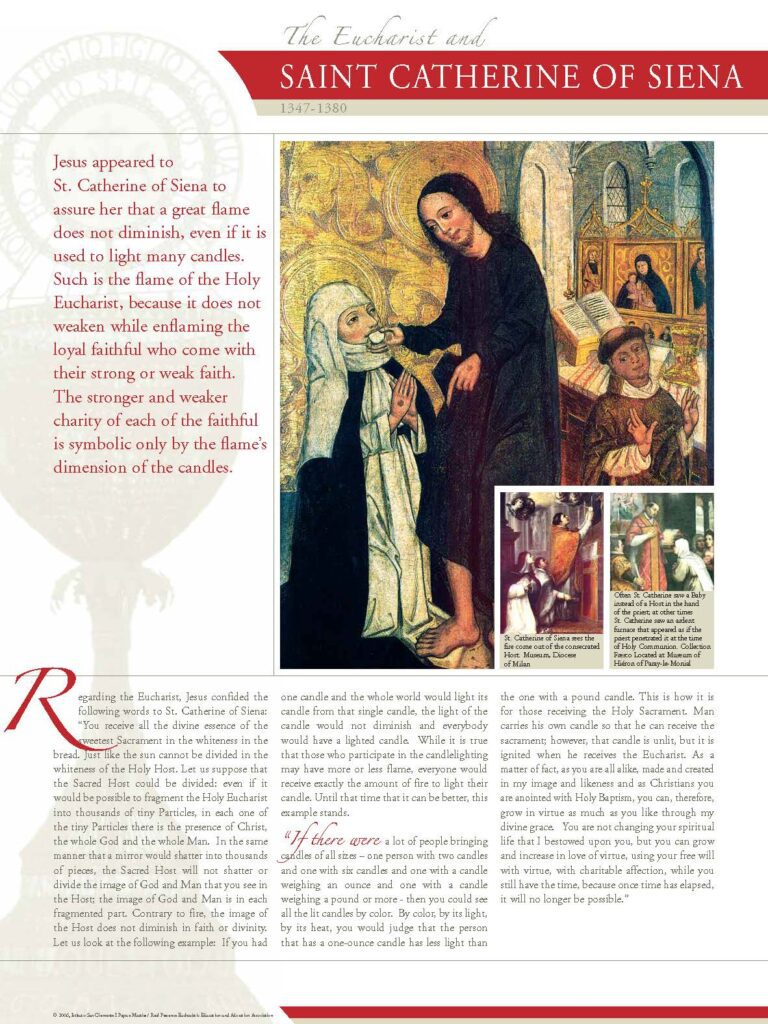
Vatican International Exhibition of Eucharistic Miracles
Gathering Space, May 27 to June 4
An extensive collection of photographs and historical records presenting a sampling of ancient and modern Eucharistic Miracles that have taken place in various parts of the world. All the miracles in the exhibition are Church-approved. The exhibition has been to more than 500 parishes in Italy and is currently traveling around the world. Now it is coming to our St. Patrick – St. Anthony Parish.
What is a Eucharistic Miracle?
A Eucharistic miracle is some extraordinary event or phenomenon, which manifests the Real Presence of Jesus in the consecrated bread and wine in a way that we can discern with our ordinary senses. The manifestation may be as simple as a host floating on air, or as astonishing as a host becoming visible human flesh.
But I don’t believe in Eucharistic miracles!
Our belief in Jesus’ Real Presence in the Eucharist is based on Jesus’ own words found in the Bible and on the lived Tradition of the church. This is what we call public revelation. The Real Presence of Jesus in the Eucharist is a vital part of our faith. Eucharistic miracles on the other hand are not part of the public revelation and so are called private revelations. We are not bound to believe private revelations, even if officially recognized by the Church. It is not their role to improve or complete Christ’s definitive Revelation. However, they can help us to live by it more fully (CCC 67). Legitimate private revelations can contribute to a deeper understanding of the mysteries of our faith and to growth in love for the Lord. Spiritual growth is an imperative for all Christians.
Are these legitimate?
Whenever a claim of a private revelation such as a Eucharistic miracle or an apparition is made, the church carries out a rigorous investigation. The revelation is only approved after the church is satisfied that (a) the people involved are credible (b) there is no natural or scientific explanation for the phenomena (c) the revelation contains nothing contrary to public revelation and (d) the revelation is leading to good fruits. The miracles in this exhibition have gone through this process and are all church-approved. In fact the exhibition was assembled by the Vatican to mark the Year of the Eucharist (Oct. 2004 – Oct. 2005).
Why are we hosting this exhibit?
Many Christians, including some Catholics, do not believe in the Real Presence of Jesus in the Eucharist. In fact this teaching is clearly supported by the Bible (see Jesus’ promise of the Eucharist, Jn. 6; the institution narratives in Mt. 26: 26-28, Mk 14: 22-24, Lk 23:19-20; and warnings against abuse 1 Cor. 11: 27-29). Some believe the mystery but do not grasp its implications or its dynamic power to impact their daily lives. Eucharistic miracles are a gift from God that recall us to the deeper meaning of this mystery of our faith.
Pope John Paul II started his encyclical letter on the Eucharist, Ecclesia de Eucharistia, with the simple yet profound statement: “The Church draws her life from the Eucharist.” Apart from Jesus, we can do nothing (John 15:5). So, whether it is an honest day’s work, playing with the kids at the park, leading family prayer, visiting the sick, feeding the poor, teaching RCIA, or rescuing babies from abortion, it is all possible because of Jesus. It is this same Jesus who is present in the Eucharist. So whether we realize it or not, the power of Jesus in the Eucharist enables us to live out our faith. The Catechism puts it this way: “the Eucharist is the sum and summary of our faith” (CCC 1327).
In Ecclesia de Eucharistia, the Holy Father reminds us: “Every commitment to holiness, every activity aimed at carrying out the Church’s mission, every work of pastoral planning, must draw the strength it needs from the Eucharistic mystery and in turn be directed to that mystery as its culmination. In the Eucharist we have Jesus, we have his redemptive sacrifice, we have his resurrection, we have the gift of the Holy Spirit, we have adoration, obedience and love of the Father. Were we to disregard the Eucharist, how could we overcome our own deficiency?” (#60)
The importance of the Eucharist to our daily lives cannot be overstated. This exhibition can help reawaken or deepen our Eucharistic faith, draw us into a more intimate relationship with Jesus, and bring about a renewed commitment to, and enthusiasm and fervor to live our Christian faith more dynamically as individuals and as a parish.



To learn more about the exhibition, or to help bring it to other parishes, schools, or other organizations, visit www.rpamichigan.org

